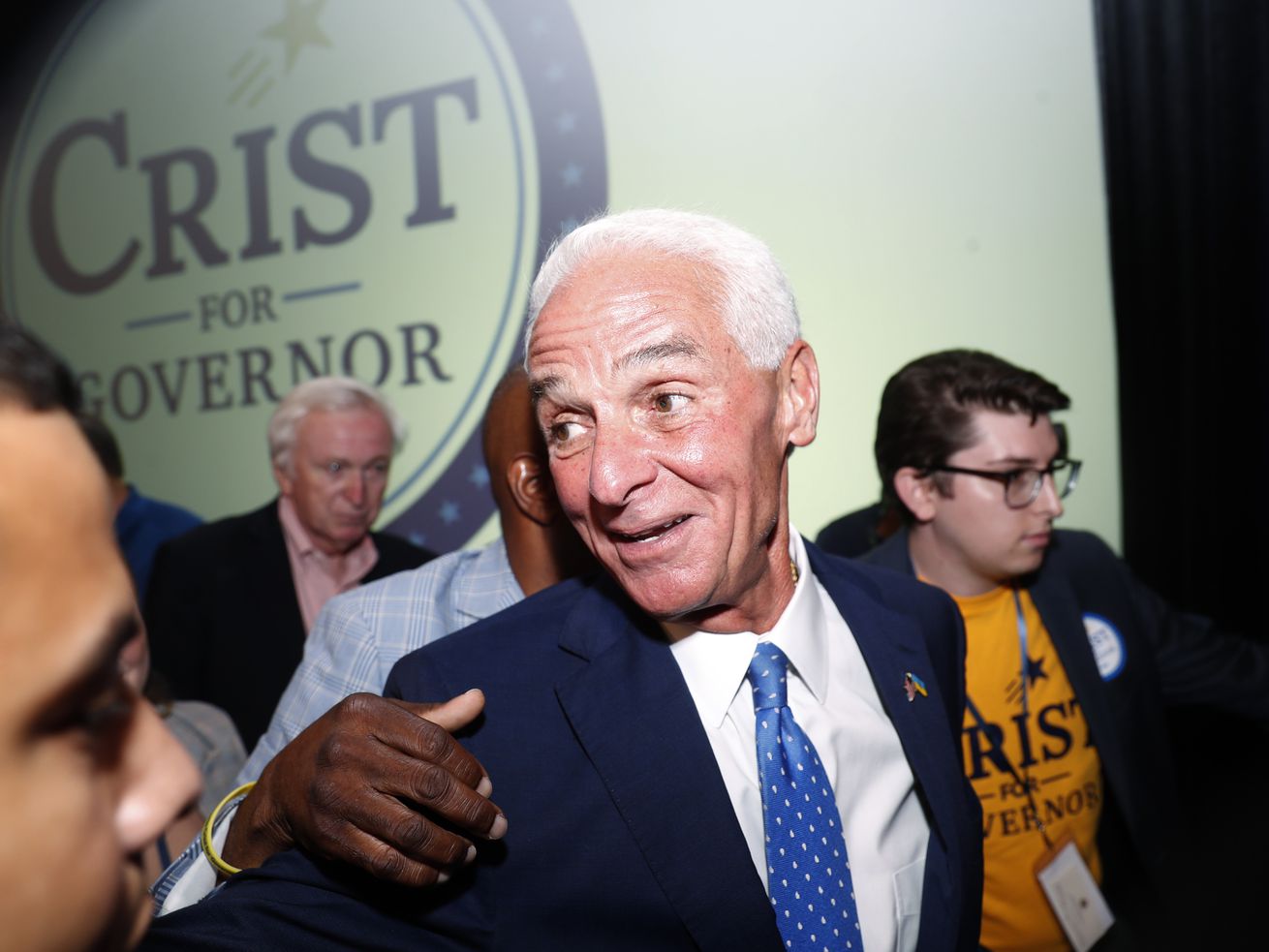The strength of abortion rights messaging was tested, and Democrats dealt with several messy primaries.
Tuesday night’s primary elections featured 2022’s last truly competitive intra-party state races: the Florida and New York primaries.
Because of redistricting quirks and incumbent advantages, only a handful of congressional seats were contested, but those that were saw fierce campaigning.
After New York state’s redistricting process went awry and the state’s top court ordered new districts to be drawn, Democratic incumbents were pitted against each other in some districts, while others became free-for-alls. Florida also saw a slate of competitive races, including the race to replace Rep. Val Demings and a slew of far-right challenges to Republican incumbents.
And finally, in Oklahoma, a run-off election between two Republicans vying to replace retiring Sen. James Inhofe resulted in victory for Rep. Markwayne Mullin.
Here are four winners and two losers from the day’s races.
Winner: Campaigning on abortion rights
Democrats’ hope that the fight for abortion rights would drive turnout got another boost on Tuesday, with Pat Ryan, the Ulster County executive, winning a special election in New York’s 19th District after he made the issue a centerpiece of his campaign.
Earlier this year, Ryan said he planned to “nationalize” this race and released a television ad emphasizing how he defended the country’s freedoms as a veteran and claiming he’d do the same for a woman’s right to choose. Tuesday, Ryan defeated Republican Marc Molinaro, the Dutchess County executive, by a close margin in the GOP-leaning battleground district.
Molinaro’s record on abortion is more moderate than some Republicans. When running for the New York governor’s seat in 2018, Molinaro said he would support strengthening laws that protect abortion rights, but balked at backing the Reproductive Health Act, a state bill that would have expanded abortion rights. During the House race, he argued that while he is “personally pro-life,” he would want to leave abortion access up to state legislatures. While Ryan worked to keep the race centered on abortion, Molinaro sought to put the focus on issues like the economy and the state’s criminal justice reform law instead.
/cdn.vox-cdn.com/uploads/chorus_asset/file/23967325/GettyImages_1242580503.jpg)
Bill Clark/CQ-Roll Call, Inc via Getty Images
Tuesday’s outcome offers one preview of how abortion rights could mobilize voters in swing districts come November. It’s particularly notable that Democrats succeeded in NY-19, which was seen as a pick-up opportunity by Republicans. Democrats are hopeful that their promises to protect abortion rights will turn voters out in their favor and combat the backlash that the president’s party typically faces during the midterms.
Both the outcome of the Kansas ballot initiative on abortion a few weeks back and Tuesday’s special election indicate it’s certainly possible this could be the case. Ryan will go on to serve the remainder of New York Lt. Gov. Antonio Delgado’s term in the House. Both he and Molinaro will also run for seats in the 18th and 19th districts this fall, respectively, as redistricting has reshaped the district they ran in this week.
–Li Zhou
Loser: New York progressives
Progressives didn’t have the best primary night in New York. Upstarts suffered from both a splintered field and the court-inflicted chaos of the state’s 2022 redistricting process on Tuesday night.
In the most hotly contested open seat, New York’s 10th Congressional District, Daniel Goldman, the main congressional attorney in the first impeachment trial of former President Donald Trump (and heir to the Levi Strauss fortune) spent Tuesday night on the verge of beating out a field of more progressive candidates with a little over a quarter of the total vote. That field included a sitting progressive, Rep. Mondaire Jones, who entered the race after his old seat was eliminated and he was forced to choose between running in the new seat that overlapped with his old district or finding another race.
The race became a bit of a microcosm for tensions running through the modern Democratic Party, with conflict along race, class, and ideological lines. A safe Democratic seat, the 10th District encompasses Lower Manhattan and Chinatown, as well as parts of progressive Brooklyn, making it one of the most diverse districts in the state. With Asian American, Latina, and Black candidates all vying for the most progressive mantle, Goldman, who is Jewish, was thrust into the more moderate lane. Goldman’s personal wealth was also a sticking point in the race, as he was able to loan his campaign $1 million — leading to criticism from progressives. With Goldman’s win, this Democratic free-for-all will result in more representation for the city’s Jewish community, but the loss of a prominent Black, gay incumbent: Jones.
Jones ended up moving to New York City after Rep. Sean Patrick Maloney — who leads the party’s congressional campaign efforts and who himself was forced to run in a new district — chose to run for the 17th District in the Hudson Valley because of those court-ordered district lines. Maloney himself beat a more progressive challenger, state Sen. Alessandra Biaggi, just an hour after polls closed.
Meanwhile, in Upper Manhattan’s 12th District, Rep. Jerry Nadler trounced Rep. Carolyn Maloney and Suraj Patel, a progressive professor and attorney who nearly unseated Maloney herself in 2020.
–Christian Paz
Loser: Carolyn Maloney
Tuesday saw yet another messy Democrat-on-Democrat primary play out, with Rep. Jerry Nadler beating fellow incumbent Rep. Carolyn Maloney in New York’s 12th District after a bitter race between the two House veterans.
Nadler and Maloney have each served in the House for 30 years and are currently the respective heads of the powerful Judiciary and Oversight committees. They’re among the Democrats who were forced into intra-party skirmishes this cycle after their districts were redrawn and combined following the results of the last census. Nadler, known for his work on former President Donald Trump’s impeachment proceedings, wound up winning by more than 20 percentage points. Maloney also spearheaded investigations into Trump, focusing on his financial dealings as head of the Oversight committee.
The race between the two colleagues grew increasingly acrimonious after they both decided to compete for the newly drawn 12th District, which includes both the Upper West and Upper East sides of Manhattan. Maloney, who called out the “old boys’” club in New York City politics, argued that her district needed a woman to represent it during a time in which abortion rights are under attack. She told New York magazine that she and Nadler haven’t spoken since they both declared their intentions to run for the seat. And she insinuated that Nadler isn’t mentally fit enough for the job, referencing a New York Post editorial that described the 75-year-old as “this close to senile.”
/cdn.vox-cdn.com/uploads/chorus_asset/file/23967331/GettyImages_1417025730.jpg)
Spencer Platt/Getty Images
Nadler emphasized his progressive record in his campaign, and highlighted his status as the city’s last Jewish representative. He suggested Maloney was out of step, pointing to her past votes supporting the war in Iraq and the Patriot Act. And he sewed up major endorsements, including from Senate Majority Leader Chuck Schumer and Sen. Elizabeth Warren.
After Tuesday’s race, Maloney becomes one of at least 13 incumbents who’ve lost their elections so far this year.
–LZ
Winner: The “safe” Democrat
Rep. Charlie Crist, a former Republican who framed himself as the moderate option in Tuesday’s Florida gubernatorial primary, was able to win his race by double digits — this time as a Democrat.
Crist beat out state agriculture commissioner Nikki Fried, the only Democrat currently elected to a statewide position, who argued that her campaign would focus on bringing “something new” to Florida. Meanwhile, Crist, who previously served as Florida governor from 2007 to 2011 as a Republican, said that he’d be able to reach a wider group of voters given his past experience. (After serving as governor, Crist ran unsuccessfully for Senate as an independent and then won a House seat as a Democrat.)
Fried sought to energize voters by emphasizing the fight to protect abortion rights, while Crist suggested that he’d be a more unifying option across party lines. That approach landed Crist key endorsements and a fundraising lead over Fried. Florida voters, it seems, picked the more established option.
Crist will take on potential 2024 presidential hopeful and sitting Republican Gov. Ron DeSantis this fall. DeSantis is favored to win the Republican-leaning state, and will bring a staggering $142 million war chest to the race. He’s become known for railing against Covid-19 vaccine mandates and supporting the “Don’t Say Gay” bill, which curbed public school teachers’ ability to teach about sexual orientation or gender identity.
“This guy wants to be president of the United States of America and everybody knows it,” Crist said in a Tuesday victory speech. “However, when we defeat him on November 8, that show is over.”
–LZ
Winner: Gen Z
If, but more likely when, Maxwell Alejandro Frost wins the November general election in Florida’s 10th Congressional District, he will become the first Gen Z member of Congress. The 25-year-old Afro-Cuban community organizer beat out two former members of Congress Tuesday night to win the solidly Democratic district enveloping Orlando, Florida, which was represented by Rep. Val Demings until she decided to launch a Senate challenge to Sen. Marco Rubio.
Frost is not a traditional candidate in any sense: he hasn’t yet finished college, drives for Uber, and has never run for public office before. But he started out in progressive politics early in his life. According to Politico, he started protesting and organizing with gun control advocates when he was 15, after the Sandy Hook school shooting, and continued to lead young activists after the Pulse nightclub shooting in Orlando in 2016 and the Parkland, Florida, school shooting in 2018, through the network of young gun violence prevention activists March For Our Lives.
/cdn.vox-cdn.com/uploads/chorus_asset/file/23967335/GettyImages_1240633879.jpg)
Stephen M. Dowell/Orlando Sentinel/Tribune News Service via Getty Images
Progressive pollsters showed Frost leading the race, and he picked up endorsements from prominent national progressives like Sens. Elizabeth Warren and Bernie Sanders, as well as the AFL-CIO’s backing. Speaking to MSNBC Tuesday night, he cast his progressive platform in plain terms: “A hopeful message, one that says that no matter who you are, you deserve health care, you deserve a good job, you deserve a union, you deserve the right to an abortion.”
Frost represents two political dynamics: One, that younger voters tend to identify as more progressive and liberal than older voters, and two, that youth have always been counted on by Democratic progressives as being the next great hope for their political fortunes. Frost also fits into the pattern of progressive lawmakers: winning primary races in safely Democratic seats, usually concentrated in urban centers, and then helping to pull the mainstream of the national party to the left.
That leftward shift among national Democrats may end up posing a challenge to Democrats’ national campaigns and to governing. America as a whole is growing less liberal, and Gen Z isn’t as progressive, or as strongly Democratic, as it’s commonly made out to be.
–CP
Winner: Election denialism
While multiple far-right candidates failed to win their primaries this week — including alt-right activist Laura Loomer in Florida’s 11th District and state Rep. Anthony Sabatini in Florida’s Seventh District — the Republicans who beat them were still strong supporters of election denialism.
In Florida’s 11th, Rep. Daniel Webster fended off a surprisingly strong challenge from Loomer; he previously voted to contest the 2020 election results. The winner of Florida’s Seventh primary, veteran and conservative commentator Cory Mills, has said that he didn’t think President Joe Biden won the last election legitimately. Republican Rep. Markwayne Mullin, who also voted to contest the 2020 election results, came out on top in the Oklahoma run-off to fill the seat of retiring Sen. James Inhofe.
The fact that these candidates beat out other Republicans who were viewed as more extreme suggests that the far right hasn’t yet taken full control of the GOP. But the degree to which election denialism has become part of “mainstream” Republicans’ platforms is also notable, and indicates that unfounded claims about the results of the 2020 election are becoming more and more normalized in the party.
–LZ
Author: Li Zhou
Read More



